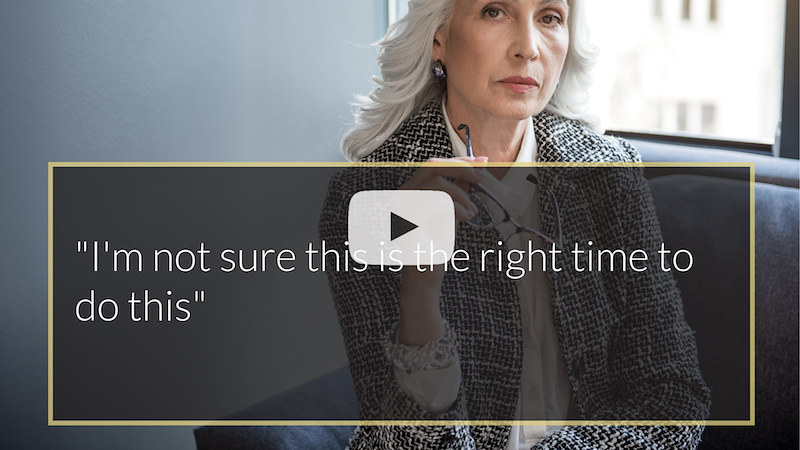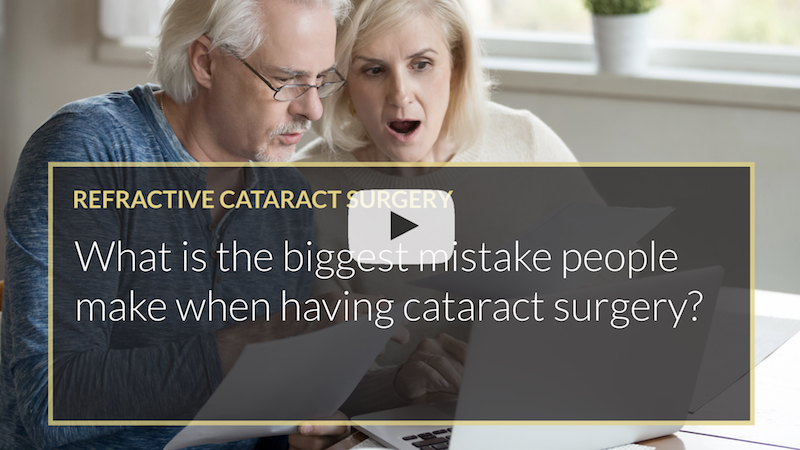Cataract - what is it?
A cataractous lens is a condition in which the lens of the eye becomes cloudy, leading to blurry vision and difficulty seeing in low light. This occurs when proteins in the lens clump together, causing a loss of transparency.
Cataracts eventually occur in everyone. The majority of cataract surgeries are undertaken for patients in their 60’s and 70’s, but surgery can be performed sooner or later than this.
Cataract Symptoms
There is published research that suggests an adverse effect of cataract on the body’s circadian rhythm, sleep and mood centres. This may contribute to disrupted sleep and altered mood, including depressive-type symptoms in some patients. These studies also provide some evidence that cataract surgery may contribute to improvement in quality of sleep and depressive symptoms in certain patients.
Cataract can cause other symptoms as well as those listed below. A thorough examination will help determine the eye’s overall health as well as the best treatment options for each patient.
Blurred or foggy vision
Difficulty seeing the writing on television or the action in a sporting fixture
Difficulty reading, or needing brighter lights to read
Shadowing or ghosting of the vision
Glare or dazzle from lights, such as when driving at night
Difficulty recognising people’s faces
Double vision, or multiple images, from one eye
Causes & Treatments
A cataract occurs naturally as we get wiser (…or older).
However, it is possible for a cataract to occur earlier than usual as a result of ocular inflammation, diabetes, taking certain medicines, ocular trauma, familial tendency, and sometimes just by chance.
Traditional NHS cataract surgery
With traditional cataract surgery, the natural lens is removed and replaced with a clear plastic lens. Spectacles are then required to see clearly at other distances. This is the treatment you will have with the NHS.
Private Cataract Surgery
If you would like to see at all distances without glasses, then Private Cataract Surgery is the best option for you.
During cataract surgery, we can replace your natural lens with a premium lens implant. This provides good distance vision and a greater ability to read without glasses.
While many patients are candidates for multifocal lens implants, this is not the case for all patients. We will discuss your particular requirements and suitability in detail at your consultation.
Cataracts and Astigmatism
Astigmatism: A Tale of Two Patients
The cases below illustrate the importance of accounting for the magnitude and direction of astigmatism before surgery. Measuring the eye with very accurate devices, understanding the effect of surgery on the eye, using the most accurate formula to model the postoperative outcome, and tailoring the lens implant choice to each individual eye is essential.
Every eye is different, and each patient should expect a tailored surgical plan for each eye – this is Prof Muhtaseb’s standard of care.
Patient 1 received cataract surgery with another surgeon at a different clinic. They had 1.75 dioptres of astigmatism before cataract surgery but left with 4 dioptres after cataract surgery. The patient was left with poor vision unless they wore glasses with a strong astigmatic prescription at all times.
The patient came to iLase for help. Prof Muhtaseb informed the patient of the benefits and risks of the various surgical means that could help to correct residual astigmatism.
Patient 2 consulted Prof Muhtaseb about cataracts. They had 1 dioptre of astigmatism in their glasses. Prof Muhtaseb determined the likely outcome with and without a toric lens implant using the latest technology for measuring the eye and calculating the best lens implant.
Prof Muhtaseb took into account the amount and direction of the patient’s astigmatism and the effect of surgery on the corneal shape. With these measurements, Prof Muhtaseb was able to recommend a toric lens implant with 2.75 dioptres of toric astigmatic correction.
The patient’s postoperative result was excellent. They had zero astigmatism in each eye and sharply focused distance vision.
Cataract FAQs
With NHS cataract surgery, you will usually be offered monofocal lenses, which have a single point of focus. This means the lens will be fixed for either near or distance vision, but not both.
At iLase you can have private cataract surgery where you choose from a range of lenses that enable the eyes to focus on both near and distant objects.
Usually, a cataract develops naturally with the passage of time. It is possible to develop a cataract earlier or later than average, and they can sometimes be associated with other medical conditions.
A cataract does not need to be ‘ripe’ for removal. Cataract surgery can be an appropriate treatment when the symptoms are sufficiently troublesome for you, and when you are willing to consider ways to improve your vision.
Not necessarily. This depends on the type of lens implant you choose to receive. With a monofocal lens, you will need glasses for reading.
Multifocal lens implants provide a greater degree of freedom from glasses than monofocal lens implants, including a greater ability to read without glasses.
Not if you have a monofocal lens implanted to give you distance vision. A monofocal lens cannot focus the vision at different points in front of your eyes so you will need to wear glasses after the surgery.
A multifocal lens, however, can provide distance and near vision without the need for glasses, and so maintains the advantage of near-sight while also providing good distance vision at the same time.
Basic information of astigmatism and if it can be treated by cataract surgery. In this video, Prof Mohammed Muhtaseb demonstrates how the surgery will be carried out by using a visual demonstration.
Yes, that can happen. If your pre-existing astigmatism is not considered in detail before surgery is performed, then it is possible for astigmatism to increase as a result of the operation. This may lead to blurred vision and the need to use glasses all of the time.
However, with a thorough set of pre-operative tests and careful planning, your astigmatism can actually be treated as part of your cataract surgery. This could make a great difference to the result of your surgery and optimise your visual outcome.
Premium lens implants can combine correction of astigmatism with multifocality, providing even greater independence from glasses after surgery.
No, this is not true. Cataract surgery can allow more light to enter the eye leading to brighter vision and the possibility of improved clarity.
It is not possible to predict how much benefit may be gained after the cataract operation, but the presence of macular degeneration should not prevent you from discussing the possible benefits of cataract surgery with an ophthalmologist.
The surgery is done in the same way as for other patients.
However, the preoperative calculations to select the correct strength of the lens implant are less accurate in eye that have undergone prior vision correction surgery such as LASIK, PRK, SMILE and others.
This means that patients are significantly more likely to have a spectacle prescription after surgery and need to use glasses most or all of the time.
Prof Muhtaseb uses the most up-to-date technology to measure the eyes and gather data preoperatively.
He then utilises the most effective lens calculation methods, based on the latest published evidence, to calculate the strength of lens required for each eye.
Prof Muhtaseb continuously monitors the outcomes of these cases and has presented the results of his surgeries for such patients at international meetings.
If you have previously undergone a vision correction procedure, it is essential that you discuss the method of lens calculation with your surgeon.
Yes, it is still possible to use a multifocal IOL if you’ve had prior vision correction surgery. The caveat is that the eye examination must be entirely normal with no abnormal features of the cornea or other parts of the eye.
Prof Muhtaseb will discuss your options in detail with you at the consultation.
When might you need cataract surgery?

You’re over 45 and would love to read again without glasses
Unfortunately, reading glasses or varifocals get in the way of many of the things you most enjoy. Yes, spectacles help, but they are annoying little appendages that you lose or must clean to see clearly.
If you feel annoyed, anxious and limited by reading glasses or varifocal spectacles, we can help. Don’t let your favourite hobbies become tiring chores.
Be free from reading specs for good. Experience the liberation from squinting and headaches that you might have already begun to accept as part of life.
Instead, look forward to enjoying everything that your vision has to offer. Whether you enjoy reading, gardening, or the great outdoors, everything looks better when your eyes see as young as you feel.

Your vision is yellowing, duller, and cataracts are forming.
The effect on your life can vary from being slightly frustrating, through to significantly affecting your ability to function independently, or even causing a devastating reduction in vision.
Before you developed cataracts, you were living a full life. You may enjoy the outdoors, have indoor hobbies or enjoy travelling. Or, perhaps you have finished working and are now taking the time to enjoy everything you may have missed when you were busy making a living.
Sadly, your eyes now dull the shine of life’s beautiful landscape. The trees, the flowers and even the sky don’t seem as bright as they used to look.
Get your life back without the compromise.

Discover the number one mistake patients make when choosing cataract surgery
Most people have cataract surgery without knowing about all the options they actually have surrounding cataract surgery. Unfortunately, most people only find this out after having cataract surgery. The information in this Wales Cataract Guide could save you frustration and worry. Simply click the button below to give us your email and we’ll send you this life changing guide.
Hear from our patients
With over 6300+ surgeries performed hear from just a few of my happy patients.
It’s been incredibly liberating to wake up in the morning and be able to see without reaching for my glasses.
I can go any anywhere and see anything near and far. I can see now as well as I could when I was 18 years of age which is incredible and I’m looking forward to clear vision for the rest of my life.
“No. 1 – My advice would be do it. No. 2 – See Mohammed if you can. I made the decision to not go down the NHS route because I wanted to see the best consultant – probably in the UK… It was absolutely worth it… because you can’t really put a price on your sight.”
“I don’t wear glasses at all now. I don’t need them. I was impressed by his professionalism, his calmness. He explained everything clearly and in layman’s language… I would say to anyone considering treatment: just do it. Don’t be afraid of it. It’s painless and it works.”
“I can’t speak highly enough of (Prof Muhtaseb). Nothing was too much trouble, you could phone anytime, day or night. I wish I had done it when I first started wearing reading glasses and just gone to Prof Muhtaseb then and got it done. I would do it all over again, but do it much faster.”
“I would definitely recommend the professor. I think his approach is perfect! If you have any anxieties at all – just check with someone who’s had the procedure done. I had no pain at all. I expected a little bit of discomfort – but no pain, that was good. It’s life-enhancing and that’s not something you can put clearly enough. I didn’t realise how green the trees were! It’s lovely!”
We are proud to be a part of these professional bodies



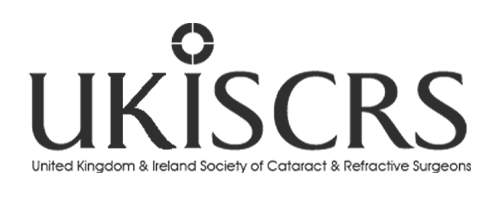



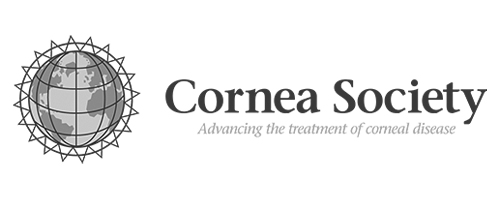
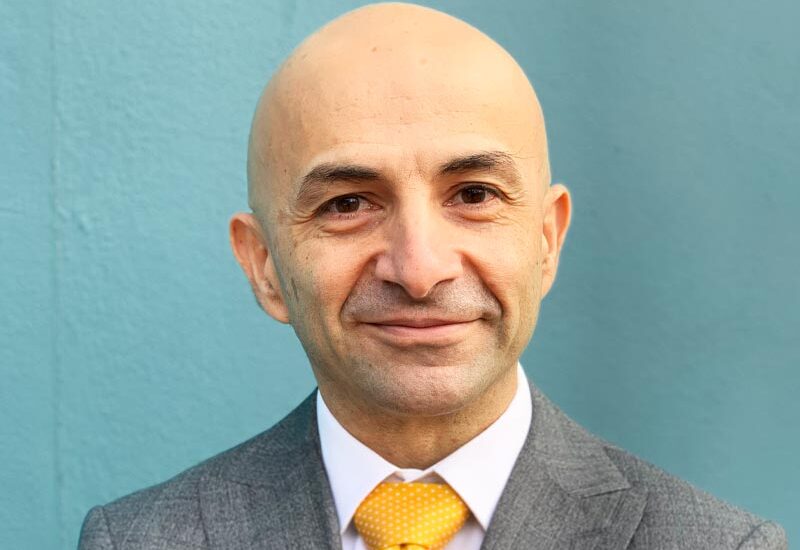
Prof Mohammed Muhtaseb, FRCOphth
Consultant Cornea, Cataract and Refractive Surgeon
Based in South Wales, he is one of the very few ophthalmologists working in the UK who is a fellowship-trained specialist in Cornea, Cataract and Refractive Surgery. He holds full specialist registration with the General Medical Council and was appointed as a Consultant in the NHS in 2006.



